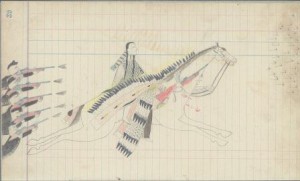
In 1876, the Lakota, Cheyenne, and Arapaho people defended their sovereignty, their land, and their lives against the United States. The Rosebud and Little Bighorn battles proved the tribes’ military strength but ultimately contributed to tragic consequences for the victors. A young Cheyenne mother, Buffalo Calf Road Woman, fought alongside her brother and husband at both battles in defense of Cheyenne freedom.
Buffalo Calf Road Woman lived during the Indian wars, an era of extreme violence against the Native inhabitants of the West. American settlers frequently trespassed onto tribal lands, and tribes retaliated by raiding settler camps. Several brutal massacres of peaceful tribal groups by whites led to widespread fear among the tribes and shocked the American public. Such violence increased tensions in the region.
After Lakota chief Red Cloud decisively defeated the U.S. military in 1866 to close the Bozeman Trail, the United States negotiated a peace treaty with the Lakotas. The 1868 Fort Laramie Treaty established the Great Sioux Nation, a huge reservation encompassing present-day western South Dakota, and designated the unceded lands between the Black Hills and the Bighorn Mountains, including the Powder River country, for the Indians’ “absolute and undisturbed use.” Northern Cheyenne and Arapaho bands also occupied this region. Continue reading A Young Mother at the Rosebud and Little Bighorn Battles